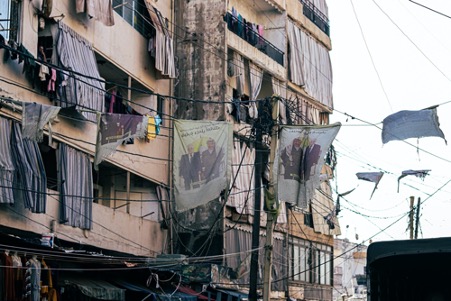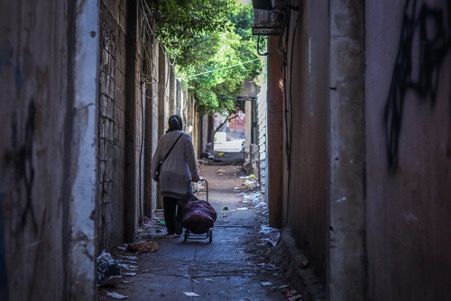As a result of the ongoing Israeli occupation, more than seven million people have fled Palestine to nearby countries. Unfortunately, leaving Palestine does not always mean that their dreams of finding peace and better quality of life are fulfilled. On the contrary, often they find themselves living in degrading conditions and being pushed to the margins of host societies that were supposed to protect them.
In Lebanon, for example, there are nearly half a million Palestinian refugees registered with the United Nations Relief and Works Agency (UNRWA) and almost half of them live in the country’s twelve official refugee camps for Palestinians. Not only are the living conditions there very poor but refugees receive practically no support from the state.
The situation of Palestinian refugees in Lebanon was concerning even before the crisis but now, faced with meager savings, limited employment opportunities, and skyrocketing inflation, they are destitute and unable to meet their basic needs.
Ghetto-like Settlements
Some Palestinian refugees in Lebanon live in informal tented settlements, but the twelve official camps have turned into permanent dwellings that resemble small impoverished cities with tall concrete houses.
One of the places that Palestinian refugees in Lebanon now call home is the Shatila refugee camp, located on the outskirts of southern Beirut. Shatila, established in 1949, is known primarily for the Sabra and Shatila massacre that lasted for approximately thirty-six hours from 18:00 on 16 September to 08:00 on 18 September 1982. During this time the Lebanese Christian militia, which was under the command of the Israel Defence Forces, slaughtered as many as 3,500 civilians. The exact number of victims is not and most likely will never be known, though.
Initially, Shatila was supposed to temporarily house five hundred people but since its establishment, the camp has grown tenfold. The biggest problem associated with that is that, as refugees in Lebanon are not allowed to build outside of the state assigned camp areas, the growth has mainly been vertical. To accommodate the rapidly expanding population of the camp, new stories keep being added randomly without careful planning or solid foundations being laid first.

Since Shatila was frequently targeted during the civil war in Lebanon, a significant proportion of the camp was destroyed. To this day, the infrastructure has not been renovated and those who reside there often live in buildings that pose a threat to their lives or that have no windows, doors, or running water.
Furthermore, the Lebanese government does not get involved in what is happening in refugee camps, so there is no garbage collection system in place, no security forces, and no education or healthcare services provided by the state.
The situation is similar in all other Palestinian camps, or even worse in the ones that house more people such as the Ein El Hilweh Camp, which has the largest concentration of Palestinian refugees in the country.
Palestinian Refugees in Lebanon Lack Fundamental Rights
The exclusion of Palestinian refugees in Lebanon is apparent not only when looking at the conditions they live in but also at their legal status. They are not entitled to Lebanese citizenship and they pass on the refugee status to their children. That means that even new generations of Palestinians born and raised on the Lebanese territory are stuck in the limbo of limited employment opportunities and being stuck in refugee camps.
Palestinian refugees in Lebanon do not have the right to own property and work in certain skilled professions. Even if they want to undertake menial jobs in agriculture or construction, they face obstacles as many of the Lebanese exercise pressure on them to return to violence-ridden Palestine rather than try to settle down in Lebanon. Consequently, Palestinian refugees work mainly in the informal sector where abuses and exploitation are common.
Moreover, to avoid closing their doors completely during Lebanon’s almost total collapse of the economy, employers often have no choice but to lay off some employees. Sadly, unskilled Palestinian workers are usually the first ones to be let go.
Not being able to obtain Lebanese citizenship, Palestinians cannot get Lebanese identity cards and therefore, they cannot access social assistance and government services. To receive medical help or any other form of humanitarian aid, they need to turn to UNRWA and charities.
But as the demand for their services is rising and the costs of preparing food baskets or distributing medicines are going up, UN agencies and aid groups are struggling to cope with helping all those who need it.
The Palestinian Issue is Not a Priority
With seventy-eight percent of the Lebanese living below the poverty line, the economic meltdown and political crisis have caused unimaginable suffering for a significant part of the country’s population, not only for refugees.
Lebanese families desperately need support to cover basic needs, including food. After all, as the Lebanese lira loses value each day, going grocery shopping often means spending one’s whole monthly wage, now equivalent to around $34.
Hence, aid organizations have been focusing primarily on reaching out to the vulnerable Lebanese. Still, more attention needs to be given to the alarming situation of Palestinian refugees as Lebanon is now their home too.
And yet, looking at the Shatila camp reveals the fact that the conditions Palestinian refugees in Lebanon live in are humiliating. Walking around the narrow streets paved with garbage, one is under the impression that those living there are not just ill-treated but have been completely abandoned.

These people have been in Lebanon for more than seventy years, waiting for the moment when Palestine is stable enough for them to go back. Now, Lebanon is becoming unlivable so thousands fear that they might lose their newly found safety and have to once again seek protection elsewhere.
In Palestinian refugee camps in Lebanon, Palestinian flags can be seen at every corner but instead of representing pride, it seems like they signify longing to return to their motherland. As the prospects of that happening are currently slim, however, Lebanon needs to at least give refugees a chance to live in dignity.
The post Palestinian Refugees are Struggling to Survive amid Lebanon’s Deepening Crisis appeared first on Palestine Chronicle.